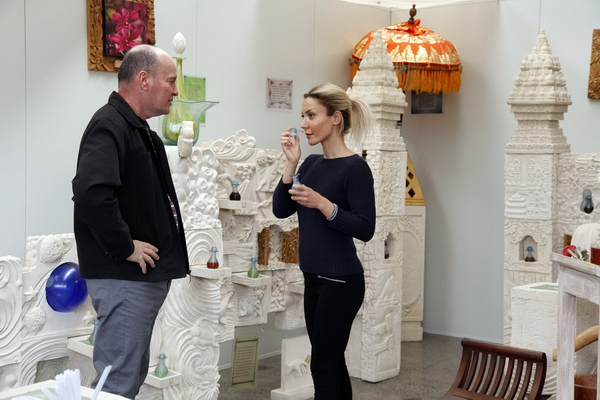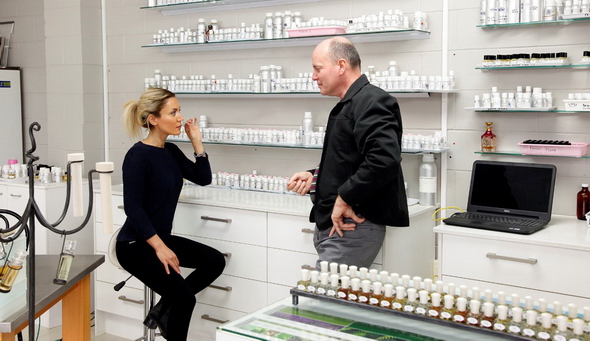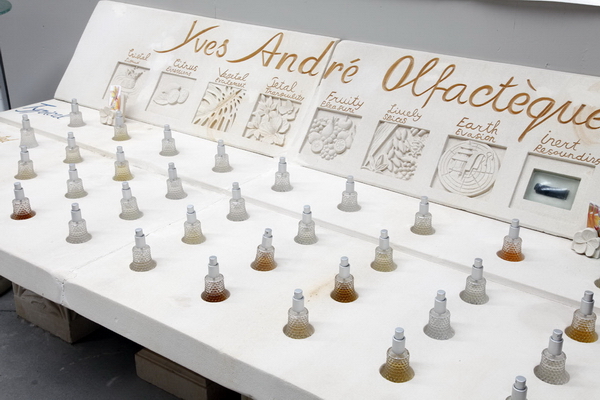Our Signature Scent
New Zealand Secret’s 100% natural signature fragrance was developed in New Zealand by master perfumier Yves Dombrowsky. With 30 years of professional experience behind him, including a long stint at Chanel fragrances, Yves, who is a Frenchman living in New Zealand for decades, has an innate gift for capturing scents that are truly unique to the natural lush wonderland that is New Zealand.
Our olfactory journey began by walking through the ‘Yves Perfume Legend Wall’, an experiential room depicting the evolution and history of fragrance in the world.
Finally, the perfume bar and its library of fragrances guided us through the selection of our archetype perfumes, and so began the creation of our signature scent.
After experimenting with other 10,000 customized perfume bases, we formulated our signature fragrance by exploring the emotions behind the New Zealand Secret brand.
Using Yves’ unique, in-house perfumier tools, we discovered our emotional connection to the perfume, using the information from this experience to illuminate the relevant notes from our own conceptualized perfume bar. This was facilitated by Yves’ bespoke computer assisted design program, which translated our ideals into fragrance reality.

Q&A with Yves the perfume specialist;
Does fragrance have an effect on our psyche?
If you are in the mood to be receptive to smells, they can definitely help you dive deep into your psyche. We often react to a smell by immediately trying to categorise it and referring it back to an existing memory.
When confronted with a smell, we take our time savouring it – unconsciously we look for delicate and subtle association that create attachments to our emotions. Our psyche needs energy and variety and smells offer endless opportunities to us to fulfill those needs.
Even after almost 20 years working in perfumery, not a single day goes by that I’m not amazed and excited by a new odour.
Can you read a person by the fragrance that they wear?
This definitely gives us information about part of a person’s personality. When we are creating a perfume for someone we delve deeper by asking personal questions about their fragrance attitudes as this helps us better understand them.
What do the different types of scents represent?
The French Society of Perfumers recognise seven main families of scents – citrus, floral, fougère (fern-like), chypre, woody, amber and leather.
Each of these is perceived differently by the individual. A citrus freshness is a mild sort of sweetness whereas floral has a kind of delicacy susceptible to lightening emotions.
What inspired you to become a perfumer and what steps did you take to become a perfumer?
I used to work in the field of environmental microbiology and as part of this role I was exposed to the potential of essential oils and this is when I familiarised myself with their smells.
It wasn’t until I went to France as part of a project I was working on that I had my first introduction to a perfumer. Impressed by my olfactory abilities, he invited me to stay longer to perfect my basic knowledge and return to New Zealand as an agent for their company. After a few years, I set out on my own and invented my own way to design and market perfume – it is now my passion.
You must have a brilliant sense of smell?
My sense of smell does play a key role in what I do but for me the brain is more important. This is because it helps me to classify and memorise everything that I smell. It also gives me the inspiration to associate odours and imagine new fragrance combinations.
Having a scientific background and a precise way of thinking is also a great help because you need an extensive knowledge of the chemicals you work with and you have to understand the complex safety and regulations of designing perfume.
The old adage of the genius perfumer lost in an exotic island and locked in his laboratory is over but I think I have been able to recreate some of the dream with a system that allows me to concoct the perfect perfume for a person that captures the right amount of smell, colour and emotion.



